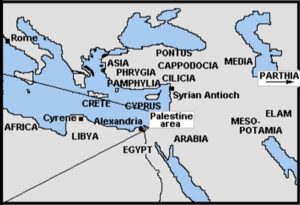GOD’S WORD FOR YOU
ACTS 2:9-13
9 Parthians, Medes and Elamites; residents of Mesopotamia, and of Judea and Cappadocia, Pontus and Asia, 10 Phrygia and Pamphylia, Egypt, and the parts of Libya bordering Cyrene ; visitors from Rome 11 (both Jews and proselytes); Cretans and Arabs– we hear them declaring the mighty acts of God in our own languages!” 12 They were amazed and very confused. They asked one another, “What does this mean?” 13 But some made fun of them and said, “They’re drunk on new wine.”
These places fall into a few general regions, and not all readers will want to know about these places. I will try to be brief.
Map by Gordon Smith may be used without further permission.
Parthia, Media, Elam and Mesopotamia were east or northeast of Judea. These were the places were the Israelites were taken into exile. The “towns of the Medes” were one of the locations where the Assyrians took their captives (2 Kings 17:6). A remnant was also taken to Elam (Isaiah 11:11). Parthia was much more distant, southeast of the Caspian Sea. It’s likely that many Israelites were taken there as well. Mesopotamia is another name for Babylon, and this, we know, is where the Jews of the Southern Kingdom were taken (2 Kings 25:20-24).
The word “Judea” in verse 8 seems out of place, but Luke probably means that there were Jews from outside Jerusalem, as would be expected at Pentecost. If the word weren’t here, commentators would have to add, “and surely there were local Jews there, as well.”
The next three regions, Cappadocia, Pontus and Asia, represent the northern route through Asia Minor. All three are addressed by Peter in his Epistles (1 Peter 1:1) along with Galatia and another northern region, Bithynia. Phrygia and Pamphilia were more central regions to the south of Asia Minor. Phrygia is mentioned in Paul’s travels as he passed through Galatia (Acts 16:6; 18:23). Pamphylia was down on the southern coast of Asia Minor (Acts 13:13; 14:24; 15:38 and 27:5).
The next two places are Egypt and parts of Libya. Egypt is well-known and was another place where exiles ended up. It’s estimated that up to two million Jews were living in Alexandria at this time. Jeremiah the prophet was forced to go there along with the daughters of one of the last kings (probably Zedekiah, compare Jeremiah 39:6-7 and Jeremiah 43:4-7). Libya is and was then, generally speaking, the next country over from Egypt. It was a vast region of farmland in those days. Along the northern coast were Cyrene and a few other settlements, including nearby Apollonia, Barca further to the west, Taucheira, and southwest of them, Euhesperides (modern Benghazi). At that point the coastline veers to the south, forming the eastern end of the big “bite” out of the north African coast known as the Gulf of Sidra.
Rome, Crete (a large island), and Arabia each had large populations of Jews. Crete was visited by Paul (briefly, Acts 27:7-14) but this was when his ship was caught by the hurricane. Later he sent Titus there (Titus 1:5) and had to warn him about false doctrine coming to Titus from the “circumcision group” (Titus 1:10-13).
Why mention these nations in this order? Aside from random chance, there seem to be two possible reasons. First, when Luke compiled this list through an interview, or more than one (his “careful investigation,” Luke 1:3), this list might have simply been remembered in this way by an eyewitness. If I were to recount for you which members of the six clans of my extended Smith family were present at our reunion last summer, it would probably have a hodgepodge arrangement rather than by certain aunts and uncles, simply because I would think of who was gathered where in the park where we all met. A second and less likely possibility has been proposed, based on the astrological work of a man named Paulus Alexandrinus who lived in the fourth century. He assigned geographical regions to certain signs of the zodiac (perhaps thinking of Deuteronomy 4:19?). I will provide a summary of his two lists, which are almost identical, and the list we have here in Acts 2:
Aries Persia Parthians, Medes, etc.
Taurus Babylon Mesopotamia
Gemini Cappadocia Judea, Cappadocia
Cancer Armenia Pontus
Leo Asia Asia
Virgo Greece Phrygia, etc.
Libra Libya Egypt & Libya
Scorpio Italy Rome
Saggitarius Cilisia & Crete Crete
Capricorn Syria –
Aquarius Egypt (Egypt)
Pisces India Arabia
The similarities are enough to make some wonder, is Luke using a reference system known in his time by all, but lost in ours, to say “people from all over the world”? It is an interesting theory, but for the moment, not something that can be proved.
In all, these regions contained millions of Jews, almost all of them living outside of Palestine. Many of these people had been living where they now were for many years; some of them had been there for generations. How many of us have ancestors who spoke another language, but now we speak English? This is why they needed the gospel to be preached in their own languages. The gift of the Holy Spirit for them wasn’t speaking, but understanding; finally, at last, understanding.
The criticism that they were drunk gave Peter the opportunity to speak up about a direct challenge. He rose to that challenge, and he met it with a sermon that continues to preach Christ crucified for our sins even today.
In Christ,
Pastor Timothy Smith
Archives by Wisconsin Lutheran Chapel: www.wlchapel.org/connect-grow/ministries/adults/daily-devotions/gwfy-archive/2019
Pastor Smith serves St. Paul’s Lutheran Church, New Ulm, Minnesota
